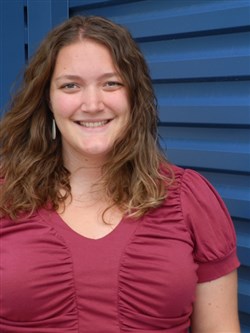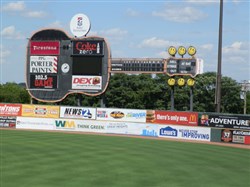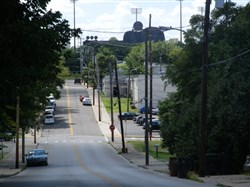VOL. 38 | NO. 30 | Friday, July 25, 2014
Ninth inning arrives for Nashville Sounds neighbors
The ear-popping, eye-dazzling flurry of the fireworks’ finale will signal the end of a season of melancholy, or at least uncertainty, for Abby Buter and her neighbors.
Abby – like all folks in this swath of South Nashville – has become reconciled to the fact the sultry nights when she can sit on her porch and watch fireworks will die with summer, Herschel Greer Stadium’s last as home of the Sounds.
“A lot of people only get to see fireworks on the Fourth of July. I get to see them every Friday and Saturday when the Sounds are in town. It’s one of the advantages of living here,” the 26-year-old says.
That summer’s eve soundtrack in the Wedgewood-Houston Neighborhood – tucked beneath and behind the Nashville Sounds’ guitar-shaped scoreboard – is beginning its coda.
Baseball season has passed the halfway point, signaling the waning of those lazy, hazy, crazy days of summer. That means the Nashville Sounds are in their last weeks as Abby’s neighbors.
The exclamation point to the long goodbye will be the final fireworks after the Saturday, Aug. 23, game against the Fresno Grizzlies. (There will be a few more games, but that will be the last of the Friday-Saturday games concluded by fireworks displays.)
While she says that “everybody seems excited” about the Sounds’ move to new First Tennessee Park at old Sulphur Dell in North Nashville, she clearly is not.
The departure is worrisome because, since 1978, the stadium on St. Cloud Hill beneath Fort Negley has given the neighborhood along Humphreys and Martin and Pillow and Chestnut a special identity. As neighborhood activist Colby Sledge says, the ballpark simply comes in handy when giving out directions to his house.
“For me, I love having the Sounds here,” Abby says. “They are so close, I can walk to the games and I can see the fireworks from my house.
“My biggest concern is I would like to see what will happen to Greer Stadium after the Sounds leave. I hope it is something beneficial to this community.”

Harvest Hands’ Abby Buter will miss the fireworks, but has high post-Sounds hopes for her neighborhood near Greer Stadium.
-- Tim Ghianni | Nashville LedgerHelping the community thrive – or trying to do so, anyway – is among the missions of her job as director of communications and development for Harvest Hands Community Development Corporation, a non-profit headquartered upstairs from the HQ of South Nashville Action People (or “SNAP,” as the zesty neighborhood association calls itself.)
Harvest Hands does what it can to help the neighborhood keep its identity in this time of flux. On the day I interrupted her in her office, Abby’s prepping to work with volunteers for the upcoming elementary-age after-school program.
In addition to after-school sports programs for neighborhood youth, her organization works to keep affordable housing options in the neighborhood.
And “we have two social enterprises,” she says, noting Harvest Hands’ efforts inside what used to be the Humphreys Street United Methodist Church, which had its congregation go by the wayside pretty much by attrition.
Sixteen young people work in the old church building, learning job skills and raising funds for the organization while roasting Humphreys Street Coffee and making WOW! Soap.
Change, the reason the church dwindled, has been fairly constant here ever since Christmas Day 1779, when Captain John Rains led his cattle across the frozen Cumberland to build a fort and plant the seeds for what now is South Nashville.
Gentrification is rising with this once worn and faded community. Old, one-family houses are being replaced by zero lot-line homes and other residential development.
Of course, these newcomers add to the community by bringing new blood, ideas, investment and (old-timers hope) commitment to help the neighborhood reach new heights.
Abby and her friends need only scope out other Nashville neighborhoods – Germantown, near Sulphur Dell, for example, 12South, Breeze Hill and East Nashville, to name but a few – to see the ups and the downs of this wave of resettlers.

Community supporters Abby Buter and Colby Sledge are among those who hope the old guitar-shaped scoreboard remains on the Greer Stadium property after the Nashville Sounds leave their neighborhood.
-- Tim Ghianni | Nashville Ledger“Change is not always bad, but it can displace people who want to stay in the neighborhood,” she says. “There’s got to be a way for gentrification to happen without chasing out all the people who want to stay.
“There are neighbors who have lived here 40 years who may have to move out because their taxes have gotten so high. Some people are moving out to Antioch and Madison because it’s cheaper to live there.”
The quandary becomes apparent even when Harvest Hands personnel retrieve the mail. “We get letters all the time from people who want to buy our property,” she says, adding that SNAP meetings are filled with people who’ve also received such offers.
In order to help stabilize the neighborhood, Harvest Hands has purchased a two-acre lot and two other lots for development of affordable housing units, and it owns two homes, one of which is occupied by a family.
While Harvest Hands is a Christian organization, its mission is to help improve the community “by working alongside our neighbors” in several South Nashville neighborhoods – this one, as well as Vine Hill, Chestnut Hill and Napier – where many families wage the economic- survival battle.
Abby, a Trevecca community development graduate who interned for this organization before beginning work fulltime four years ago, says one of the best things about Harvest Hands is it requires employees to live in the neighborhoods served: “It’s community development by working alongside people who are living here.” Neighbors helping neighbors.
One of “the cool things” about her neighborhood is “how diverse it’s always been” racially, professionally and economically.
All of the gentrification – and these are handsome new homes and she says a large apartment or condo complex is planned for the old A.B. Collier Wrecker property – is to be expected in any neighborhood of this “it” city that’s bursting at its seams while inspiring silly soap operas and love songs.

The back of the iconic Nashville Sounds guitar-shaped scoreboard is visible almost everywhere you drive in this neighborhood.
-- Tim Ghianni | Nashville Ledger“I would say the new houses are not necessarily a bad thing, but the kind of domino effect it has on low-income families is bad. It displaces people who want to stay here,” she says. “New things are great and change doesn’t have to be bad, but the side effects can be.”
Colby Sledge, the community activist who settled here four years ago with his wife, Lindsey Harris, professes commitment to this neighborhood for the long haul, eventually planning to raise a family here.
As former SNAP co-chair, Colby is committed to making sure that as change is accommodated, so are the affordable housing needs of the people who want to remain, helping the neighborhood retain its “working class” aura and diversity even while undergoing change. “The neighborhood identity is evolving,” he says, simply.
He and Abby both note the importance of the nearly departed Sounds to their community’s fabric. Hopes are to retain at least an iconic piece of the Greer history that brought Steve “Bye Bye” Balboni, Don Mattingly, Prince Fielder, Reggie Jackson, Willie McGee and even Michael Jordan to Wedgewood-Houston.
“The scoreboard is part of the way the neighborhood is identified. The scoreboard is kind of the skyline of this neighborhood,” Abby says.
It’s so iconic that a flashy, state-of-the-art, guitar-shaped scoreboard is planned for the new park in North Nashville. What will come of the old one, though? Anywhere you drive these streets, if you look hard enough, you will see a slice of that near-antique guitar-shaped scoreboard.
An illustration of that skyline will accompany this Saturday’s Harvest Hands night at Greer.
“The team will wear jerseys with that skyline, and people will be able to bid on them during the game,” she says. The funds will go to Harvest Hands and its programs.
Around here, they’ve come to terms with the loss of the ballclub, ending the existential wonder of living in a neighborhood where Boys of Summer knock horsehide over the fences and fireworks are the norm.
But there is something they are not going to give up easily.
“I would love to see the scoreboard stay,” says Colby, a public relations executive and former journalist. “There are so many opportunities to make it a landmark for the area, which has increasingly become home for members of the artistic community.
“It would be great to keep it there, especially since our area is emphasizing the creative minds,” he says. “It could be a very good representation of what our community values.”
He says the abandoned scoreboard could become high-profile public art, which muralists could take turns painting.
It could be the launching point to getting the word out about city activities, celebrations and achievements, “a cultural marker,” as he says.
Both Abby and Colby – friends, as well as neighbors – have hopes for the actual ballpark space. Perhaps it was the field of dreams for years for those hoping to get their cups of coffee in the Bigs.
Now, perhaps, it will nurture new dreams by serving as green space, a park adding to the family-friendly uptick of the neighborhood.
“If that space can be turned into park or more fields for people here to enjoy, it would be cool if the scoreboard could stay and remain a part of South Nashville,” says Abby.
It would be a proud reminder that this neighborhood exists. Sure it’s undergoing growing pains. But even though the fireworks are fizzling, hope’s sizzling.